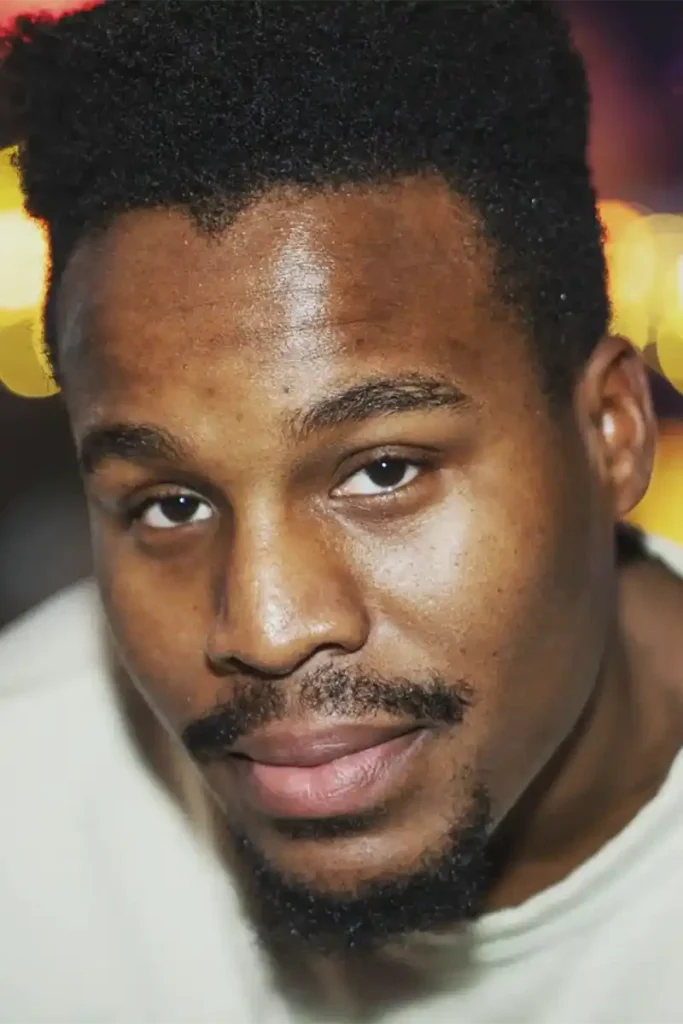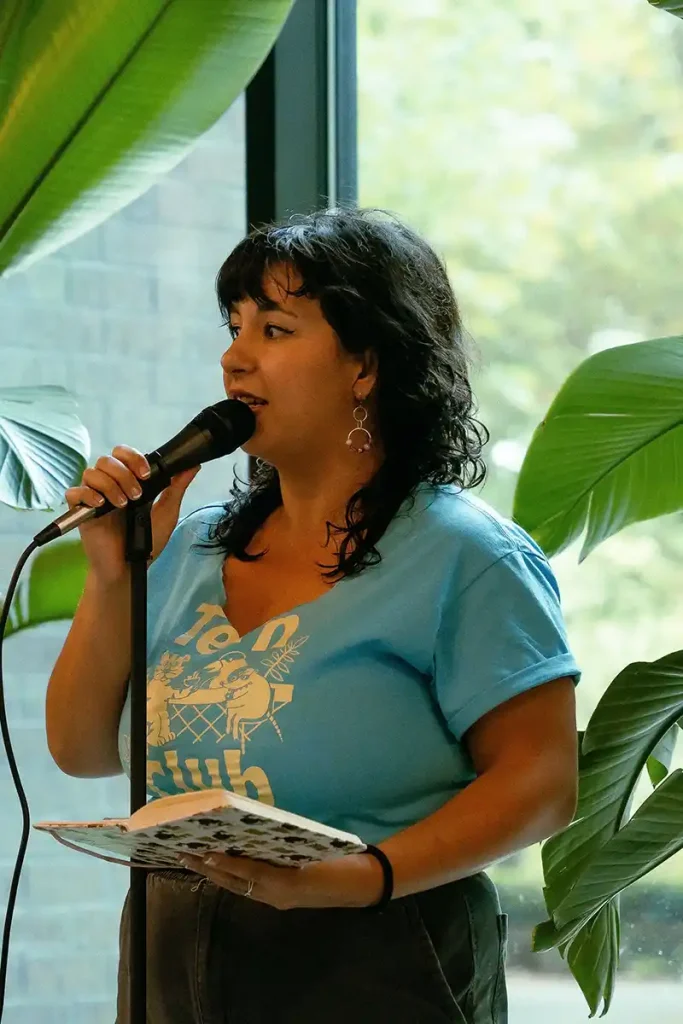The Funny Thing About English: An Interview with Clinton Ricks and JoAnna Brooker
Two English alumni discuss how poetry and rhetoric set them up for comedic success and how inspiration often comes from the most unlikely of places.
Z Eihausen: What drew you to creative writing initially?
Clinton Ricks: I’m still figuring this one out, honestly. But I know it has to do with LeVar Burton and Reading Rainbow.
JoAnna Brooker: Probably being lonely as a child. Turns out if you’re a big reader with no friends, your brain can become your friend (and sometimes your frenemy).
ZE: What were some of your favorite classes as an undergraduate?
CR: Shout out to Ben Lee, Michelle Commander, Misty Anderson, Marcel Brouwers, Bill Hardwig, Marilyn Kallet, Margaret Moore, Renée D’Elia-Zunino, and many others. Some of my best moments on campus were in their classrooms. Also, shout out to all professors who provide food– you are appreciated and never forgotten.
JB: I entered UT as a journalism student but changed my tune after meeting the incredible Lisa King and taking her Cultural Rhetorics course. I took it as a sophomore with a bunch of seniors and that class straight up changed my life and my world view. I also loved literary journalism with Amber Roessner, and every class I took with Erin Elizabeth Smith was delightful. Could not recommend these three professors more.
ZE: How are the skills you developed through your English degree transferable to your work in comedy today?
CR: Being diligent when reviewing a text is a useful skill. It is important to understand the entire situation when gathering information for joke material.
JB: I’m a total nerd for rhetoric– understanding what someone’s worldview or opinion is underneath their joke. If I can smell that it is unkind, punching down, or the like, I’m not interested. I’m very conscious of the subtext of my jokes, and always trying to reword things so that what I’m saying is what I mean to say. I can’t say enough about how media literacy and rhetoric work help with this.
ZE: Which literary resources were most beneficial as you began your career in comedy?
CR: For me, any and everything. There is inspiration in unlikely places if you keep an open mind.
JB: Poetry is underrated as a source of humor and surprise. The best comedy advice I got starting out was in order to make punchlines that punch, always make the end of your sentence a surprise. Poetry crushes at this. I especially love Chen Chen, Franny Choi, Rachelle Toarmino, and Sam Herschel Wein (meta shoutout) for that.
ZE: Which genres of writing do you find you draw most from in comedy?
CR: Nonfiction for sure. Reality has the best joke material.
JB: I would say nonfiction, because there’s nothing funnier than the truth.
ZE: What forms of comedy do you generally work in (i.e. performative, written, etc.)?
CR: Stand-up, there is something about facing the audience alone. Sometimes, I feel like a gladiator, but instead of lions, it’s a drunk crowd of strangers, which can be much scarier than lions.
JB: I mostly perform standup, although I have been dabbling in comedic essays again. Honestly, existing as a person in unfamiliar places feels like I’m doing a long bit sometimes.
ZE: What do these forms look like for those who are unfamiliar with the comedy scene?
CR: Honestly, it depends on the comic. A bad stand-up comic looks like someone who enjoys masochism, and a good stand-up comic looks the same.
JB: It depends on how you feel about laughing, and on laughing at what. I’ve found people that consider some things sacred or unspeakable, cannot bear comedy. When a comic is doing great, the laughs are like beats. When they’re bombing, you could hear a pin drop in the room.
ZE: Do you continue to write in forms other than comedy? If so, how do these comedic tools carry over in other areas of your writing?
CR: I enjoy writing poetry. Stand-up comedy usually leads you down a path of self-revelation. Eventually, a good comic has to develop a relationship with their inner-self to, in my opinion, create material that shows how they truly and honestly see the world. I had a difficult time doing that as a poet, but comedy has helped me become better at that.
JB: I enjoy all genres. As someone who entered college as a journalist and left as a poet and a standup, I find that multigenre or mixed genre work resonates with me more and more. I think comedy is about being honest with yourself and others, even if it’s embarrassing or shameful. Bringing comedy to fiction, poetry, and creative nonfiction not only helps me take myself less seriously, it adds a new flavor or texture to a story that would otherwise just be heartbreaking or infuriating.
ZE: What advice do you have for undergraduate English majors who are considering careers in comedy?
CR: Learn the business side. Being funny is 10 percent of being a financially successful stand-up comic. Don’t punch down, because I believe in you and you’re better than that. Once you start, don’t stop. You’re going to bomb, maybe a lot or maybe a little, but it will happen. Don’t be afraid to copy your favorite comic in the beginning, just don’t hold onto those training wheels for longer than needed. Copy energy and delivery, but never jokes. Have fun and deconstruct the world around you. Be what you want to see in your scene, and never sell out. Follow me on Instagram @Southernaut and enjoy undergrad and having summer and winter breaks, work on building a proper resume, and take care of your knees and your back. Also, go to 7 Birds State Park. It’s dope.
JB: If you want to be any good at it, you have to accept that you will be very bad at it for a while. It is rare to crush at your first open mic. But the rejection is good for you, it helps you grow, and it challenges you. There’s more money in producing than just performing, especially starting out. I would befriend people who make you laugh and are funnier than you, listen to only their advice (never take advice from someone you don’t respect or isn’t doing something you wish to do yourself), and produce and do the shows that you feel called to in your scene. Watch comedians you enjoy and figure out what you want to replicate in your work from them, same as the advice you’d receive in Professor Knight’s class. The two most important rules of standup are have fun, and be funny. If you stick to that, you’ll be where you want to be in no time.


Clinton Ricks graduated from UTK in 2017 with a BA in English. These days he spends his free time reading old books, watching anime, and researching new pie recipes.
JoAnna Brooker is a writer & comedian in Atlanta, Georgia who graduate from UTK in 2019 with a BS in Journalism and English Rhetoric. She’s performed all over the Southeast, from apathetic cat cafes to sweaty barns on holler farms. They’ve been featured in the Second Bell music festival, at the Comedy Catch, Laughing Skull, & Tiny Cupboard, & they were also a producer with the Knoxville collective Tiny Stage Comedy. Their comedy ranges from surreal to sincere, with everything bawdy & obscene in between. They can be found on all social media platforms @cupofjoanna.
Z Eihausen (she/her) is an emerging writer from Tennessee. She is currently a senior at the University of Tennessee-Knoxville studying creative writing and philosophy. She previously interned at Sundress Academy for the Arts and is now Staff Director. She also likes bees.